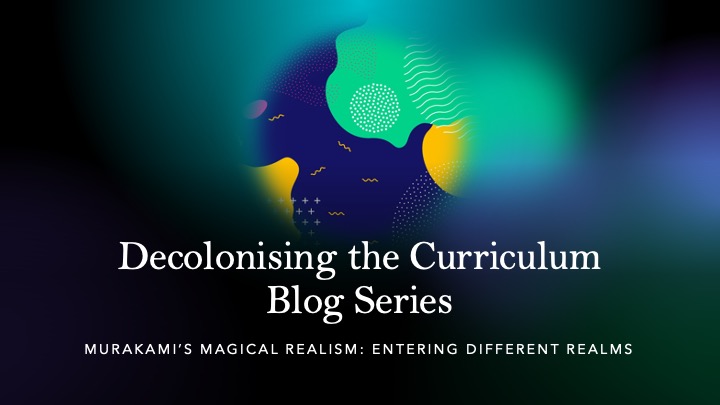
By Mitzi Castle
Haruki Murakami is a Japanese author who focuses his writing on magical realism. Yet this genre is fluid, and Murakami’s novels range from fantasy to non-fiction. Magical realism is characterised by the inclusion of fantastical elements in fiction that appears realistic. The focus is not on the magical aspects of the story, but rather on the effects they have on the characters. Magical realism originates from Latin America and comprises oral storytelling and cultural elements. The genre itself is entangled with aspects of heritage, with many of its most prized authors criticizing aspects of colonialism and imperialism. Through its acceptance of fantastic elements, the narrative disregards typically Western ideals of rational modernity and gives value to the tradition and folklore that colonisers attempted to eradicate.

Photo signed by Haruki Murakami. Image credit: Wiki Commons.
Born in 1947, Murakami was only three when the occupation of Japan by the United States ended. After this, Japan entered a state of relative affluence, centred on consumerism. Murakami’s writing focuses on self-identity and may be read to resist the distraction of material goods. Immersing oneself in a Murakami novel allows for an exploration of Japanese culture that could not otherwise be understood. However, Murakami represents just one voice of the post-World War Two generation of Japan, many aspects of his novels identify him as a ‘black sheep’ of Japanese writing. For instance, he writes mostly about Japanese characters, who consume Western music and culture as he did as an adolescent. He also writes whilst listening to music and used to run a jazz bar in Tokyo. There are similarities between jazz improvisation and his writing style; both are transient and free-flowing. The title of his fifth novel, Norwegian Wood, is taken from a Beatles song, incidentally, linking his novel to Liverpool. Not only does this connect Japan globally, but it also displays a more accurate, modern representation of the country, perhaps subtly pushing back at the harmful romanisation (to the point of fetishization) of East Asia.
Using magical realism Murakami subverts orientalist narratives of his country. He mimics views of Japan as mysterious, however many of his surreal plotlines interweave western capitalism into its marvellous elements. For example, in his novel Kafta on the Shore a supernatural shapeshifter takes on the form of Colonel Sanders. This character satirizes typical western views of Japan as being archaically enigmatic.
Similarly, in western culture, there is an emphasis on logic. In Murakami’s novels, characters do things without reasoning or explanation, emulating a more truthful human psyche. His novels act as a lived experience rather than a linear story, again combatting western consumerist principles of achievements being outcome driven. Instead, Murakami takes from Japanese culture and focuses on the process, his endings are not the most fundamental part of his story, instead, aspects throughout protrude. In essence, his writing embodies the Japanese phrase wabi-sabi - beauty in the simple or incomplete, making his novels accessible to those from other cultures or reading a translated version.
Sources Consulted:
Khurana, Vani and Thakur, Rasleena, ‘Privileging Oddity and Otherness: A Study of Haruki Murakami’s Kafka on the Shore’ Rupkatha Journal on Interdisciplinary Studies in Humanities 12.5 (2020), 11-11.
Strecher, Matthew C., ‘Magical Realism and the Search for Identity in the Fiction of Murakami Haruki,’ Journal of Japanese Studies, 25. 2 (1999), 263-298.
Treisman, Deborah, ‘Haruki Murakami on How Memory Can Trigger a Story,’ The New Yorker February 10 2022 < https://www.newyorker.com/books/this-week-in-fiction/haruki-murakami-02-17-20> [Accessed 4 April 2020].